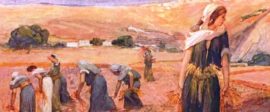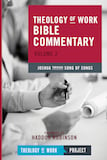Elisha’s Restoration of a Household’s Financial Solvency (2 Kings 4:1-7)
Bible Commentary / Produced by TOW Project
Bonnie Wurzbacher on the Role of Business |
After one of the prophets in Elisha’s circle died, his family fell into debt. The fate of a destitute family in ancient Israel was typically to sell some or all of its members into slavery, where at least they would be fed (see “Slavery or Indentured Servitude (Exodus 21:1-11)” at www.theologyofwork.org). The widow is on the verge of selling her two children as slaves and begs Elisha for help (2 Kings 4:1). Elisha comes up with a plan for the family to become economically productive and support themselves. He asks the widow what she has to work with. “Nothing,” she says, “except a jar of oil” (2 Kings 4:2). Apparently this is enough capital for Elisha to begin with. He tells her to borrow empty jars from all her neighbors, and fill them with oil from her jar. She is able to fill every jar with oil before her own jar runs out, and the profit from selling the oil is enough to pay the family’s debts (2 Kings 4:9). In essence, Elisha creates an entrepreneurial community within which the woman is able to start a small business. This is exactly what some of the most effective poverty-fighting methods do today, whether via microfinance, credit societies, agricultural cooperatives, or small-businesses supplier programs on the part of large companies and governments.
Elisha’s actions on behalf of this family reflect God’s love and concern for those in need. How can our work increase the opportunity for people in poverty to work their way toward prosperity? In what ways do we individually and collectively undermine the productive capacity of poor people and economies, and what can we do, with God’s help, to reform?









